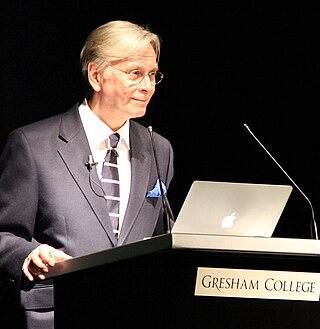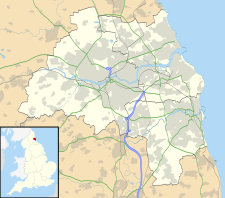
Newcastle upon Tyne, or simply Newcastle, is a city and metropolitan borough in Tyne and Wear, England. It is located on the River Tyne's northern bank and is the largest part of the Tyneside. With a population of 286,445 it is North East England's most populated settlement in the census.

Addenbrooke's Hospital is a large teaching hospital and research centre in Cambridge, England, with strong affiliations to the University of Cambridge. Addenbrooke's Hospital is located on the Cambridge Biomedical Campus. It is run by Cambridge University Hospitals NHS Foundation Trust and is a designated academic health science centre. It is also the East of England's major trauma centre and was the first such centre to be operational in the United Kingdom.

The Freeman Hospital is an 800-bed tertiary referral centre in Newcastle upon Tyne, England. The hospital is managed by the Newcastle upon Tyne Hospitals NHS Foundation Trust and is a teaching hospital for Newcastle University.
Sir James Calvert Spence, & Bar was an English paediatrician who was a pioneer in the field of social paediatrics. He was a founding member of the British Paediatric Association.
The John Hunter Hospital and John Hunter Children's Hospital is a teaching hospital and children's hospital in Newcastle, and northern New South Wales, Australia. The 820 bed hospital is the main teaching hospital of the University of Newcastle. The hospital contains the only trauma centre in New South Wales outside the Sydney Metropolitan Area, and has the busiest emergency department in the state. John Hunter is the busiest trauma hospital in the country

Cardiff and Vale University Health Board (CAVUHB) is the local health board of NHS Wales for Cardiff and Vale of Glamorgan, in the south-east of Wales. Formed on 1 October 2009 through the amalgamation of three NHS organisations in the Cardiff and Vale of Glamorgan area. The three organisations amalgamated were: Cardiff and Vale NHS Trust, employing 12,000 staff and previously responsibility for hospital services in the Cardiff and Vale of Glamorgan area; Cardiff Local Health Board; and Vale of Glamorgan Local Health Board both responsible for GP, Dental, Optical and pharmacy services. The headquarters of the Board is in the University Hospital of Wales, in Cardiff. Cardiff and Vale University Health Board is the operational name of Cardiff and Vale Local Health Board.

The Royal Victoria Infirmary (RVI) is a 673-bed tertiary referral hospital and research centre in Newcastle upon Tyne, England, with strong links to Newcastle University. The hospital is part of the Newcastle upon Tyne Hospitals NHS Foundation Trust and is a designated academic health science centre.

Bristol Royal Hospital for Children, also known as the Bristol Children's Hospital, is a paediatric hospital in Bristol and the only paediatric major trauma centre in South West England. The hospital is part of the University Hospitals Bristol and Weston NHS Foundation Trust (UHBW), which includes eight other hospitals. The hospital is located next to the Bristol Royal Infirmary in the city centre.

Newcastle General Hospital (NGH) was for many years the main hospital for the city of Newcastle upon Tyne, England. As part of Newcastle upon Tyne Hospitals NHS Foundation Trust moving from three to two key sites, the hospital was closed and the majority of services transferred to the city's other two hospitals, the Royal Victoria Infirmary and the Freeman Hospital. The Accident and Emergency Department and Intensive Care closed on 16 November 2010. A walk-in centre for minor ailments and injuries remained on the site.

St Nicholas Hospital is an NHS psychiatric hospital located in Gosforth, Newcastle upon Tyne, England, UK. The entrance is located on Jubilee Road. The buildings range from Victorian-era to modern facilities and occupies 12 hectares of land. It is managed by Cumbria, Northumberland, Tyne and Wear NHS Foundation Trust.

The Sir Bobby Robson Foundation is a British cancer research charity which raises money to fund the early detection and treatment of cancer, and clinical trials of anti-cancer drugs. Based in the North East of England, the Foundation was launched on 25 March 2008 in the name of Sir Bobby Robson, himself a cancer sufferer five times since 1992, and who died of the disease on 31 July 2009.
Ann Barrett OBE, is Emeritus Professor of Oncology in the University of East Anglia, England, and formerly deputy dean of the School of Medicine and lead clinician for oncology at the Norfolk and Norwich University Hospital NHS Trust. She was awarded an OBE in 2010 for services to medicine. She is also a fellow of the Royal College of Surgeons in Ireland.
Newcastle upon Tyne Hospitals NHS Foundation Trust is one of the Shelford Group of University Teaching Hospitals and an NHS Foundation Trust. It provides acute medical services in Newcastle upon Tyne, England, at Royal Victoria Infirmary and Freeman Hospital, the Campus for Ageing and Vitality, Newcastle Dental Hospital, Newcastle Fertility Centre and the Northern Genetics Service.

Martin John Elliott is a British surgeon. He is presently Provost of Gresham College, taking over from Simon Thurley. Elliott was 37th Professor of Physic at Gresham College from 2014 to 2018, where he is also Emeritus Professor and Fellow. He delivered a series of free public lectures on The Heart of the Matter, "to explore [...] the challenging medical, ethical, financial and political issues of our time."

Kuala Lumpur Hospital is the largest Malaysian government-owned public general hospital in Kuala Lumpur, the capital city of Malaysia. Founded in 1870, HKL is a not-for-profit institution and serves as the flagship hospital of the Malaysian public healthcare system. This hospital serves as a tertiary and referral hospital. It is located on 150 acres of prime land in the city with 84 wards and 2,300 beds, making it one of the largest hospitals in the world. More than 90 per cent of the beds in HKL are allocated for subsidized patients, providing access to an internationally established standard of affordable healthcare.
Philip Caves (1940–1978) was an Irish cardiothoracic surgeon. In 1972, while at Stanford University, he pioneered the use of the bioptome and transvenous endomyocardial biopsy in the early diagnosis of heart transplant rejection. It was considered the most significant advance in antirejection therapy of the time. Awarded the British American Research Fellowship in 1971, Caves worked with pioneering cardiothoracic surgeon Norman Shumway at Stanford and became staff surgeon leading the transplant programme by 1973. A year later he went to Edinburgh as a senior lecturer in cardiac surgery, where he became particularly interested in pediatric cardiac surgery.

Frederick John William Miller was a British paediatrician, who made critically important contributions in describing tuberculosis in childhood, including the definition of the treatment and control, of the disease. Along with Sir James Spence and Sir Donald Court, Fred Miller were responsible for the formulation of the major epidemiological cohort study called the Newcastle Thousand Families Study. After that the group was called the Newcastle Trio in the medical community.
Sir Alan William Craft is a British paediatric oncologist and Emeritus Professor of Child Health at Newcastle University. Craft was most notable for work as one of nine founders of the Children's Cancer Study Group, focusing his research on paediatric oncology, especially the epidemiology of bone tumours that further led to an oncology research unit which has been involved in aetiological studies and in particular the role of irradiation in the development of childhood cancer.
Kaylee Davidson-Olley was the United Kingdom's first successful heart transplant baby when she received a replacement heart at less than one year of age. In 2017 she celebrated her 30th year after the transplant operation; it was her 30th year as the longest surviving heart transplant baby in Europe. The operation was performed by cardiothoracic surgeon, Christopher McGregor at the Freeman Hospital, Newcastle, which became one of only two UK centres performing transplants in children, and the main hospital in the UK carrying out transplants for adults born with congenital heart disease.

Schneider Children's Medical Center of Israel, founded in 1992, is a paediatric hospital focused on children's health, particularly organ transplantation and cancers. Schneider treats infants, children, teens, and young adults up to age 18 and for some conditions, age 21.















